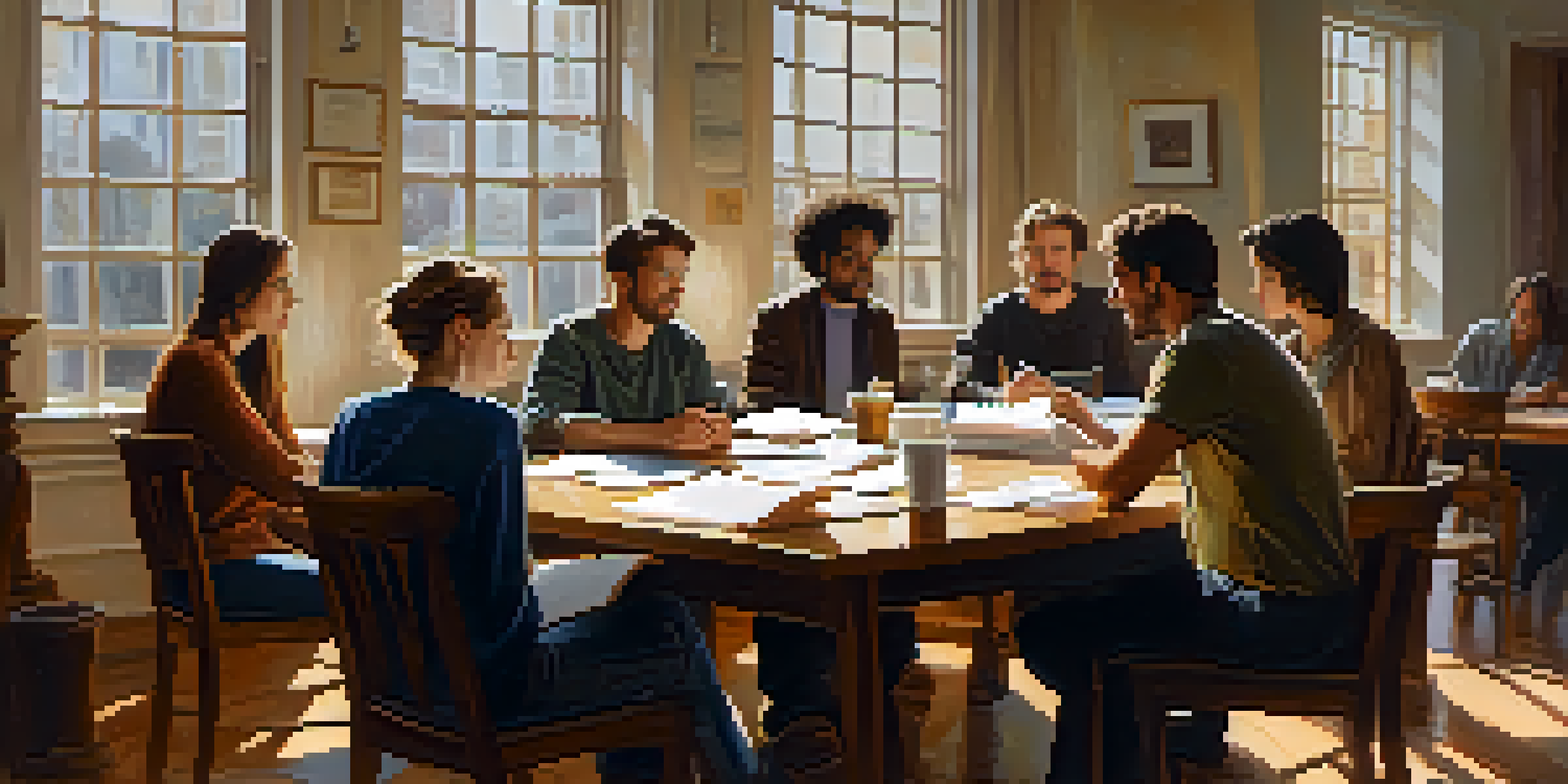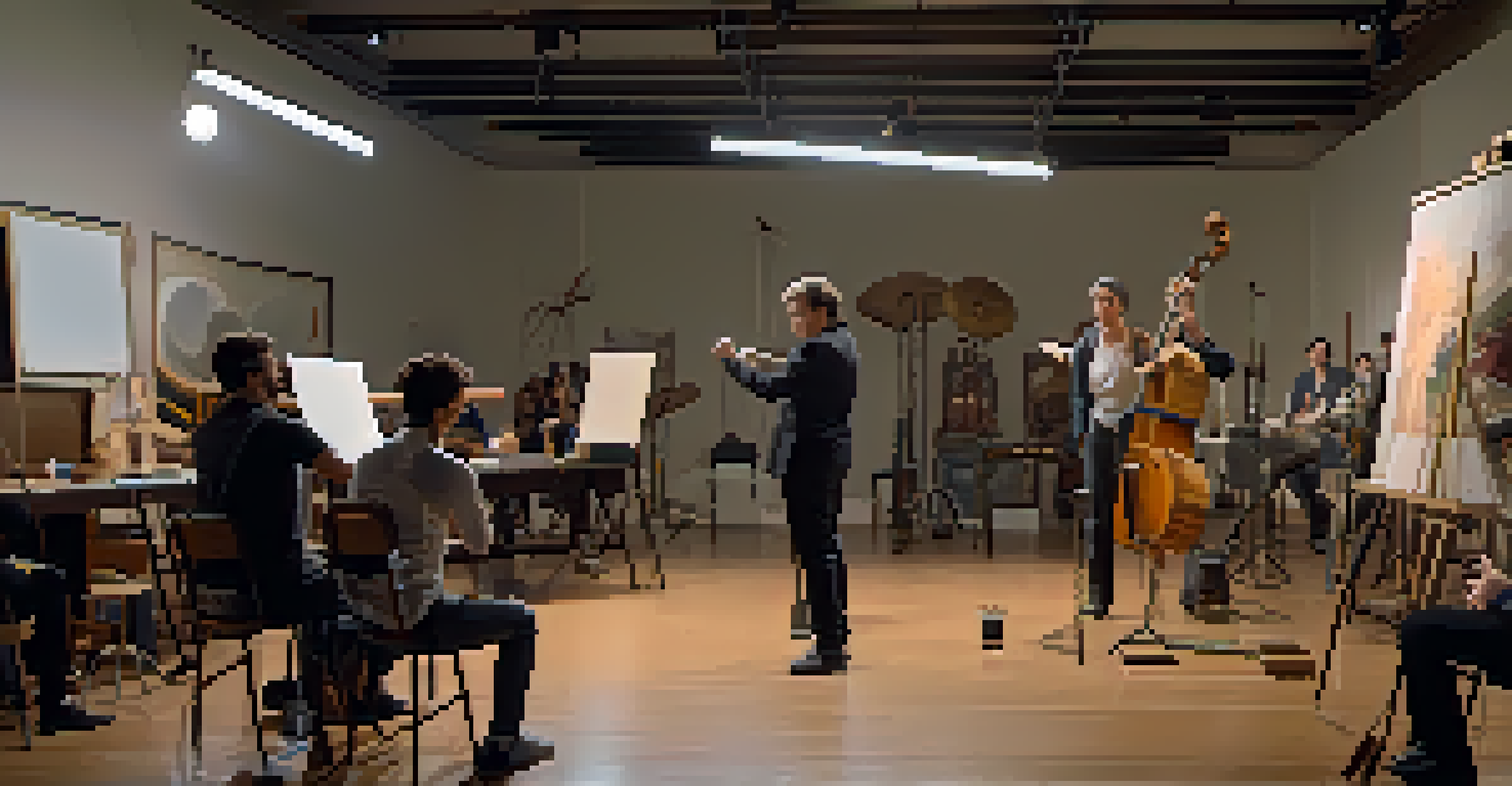Understanding the Importance of Rehearsal Techniques in Acting

Why Rehearsals Are Essential for Actors
Rehearsals are a fundamental part of the acting process, allowing actors to explore their characters and the script in depth. This time spent working through scenes helps to build confidence and comfort in performance. It’s during rehearsals that actors can experiment with their delivery and emotions, discovering nuances that enrich their portrayal.
Rehearsal is the time to take risks and experiment; it’s where the real magic happens.
Moreover, rehearsals foster collaboration among cast members, creating a cohesive unit that brings the story to life. Just like a band practices together to perfect a song, actors must harmonize their performances to create a seamless narrative. This teamwork not only strengthens relationships on stage but also enhances overall production quality.
Finally, rehearsals serve as a vital training ground for developing an actor's skills. They help in refining techniques, whether it's mastering timing, body language, or vocal delivery. Without this practice, even the most talented actors can struggle to deliver a compelling performance.
Types of Rehearsal Techniques Used in Acting
There are several rehearsal techniques that actors use to prepare for their roles. One common method is the 'table read,' where the cast gathers to read through the script aloud. This activity helps actors understand the story dynamics and character relationships, laying a solid foundation for further exploration.

Another effective technique is 'blocking,' which involves mapping out the physical movements and positioning of actors on stage. This helps in visualizing how scenes will unfold and can greatly enhance the storytelling aspect of the performance. Think of it like choreographing a dance – every movement counts.
Rehearsals Build Confidence
Rehearsals allow actors to practice their lines and movements, reducing performance anxiety and increasing confidence.
Finally, 'improvisation' can also be a powerful tool during rehearsals. By allowing actors to step outside the script and respond spontaneously, they can unlock unexpected insights into their characters. This flexibility can lead to more authentic performances, as actors become more in tune with their roles.
Building Character Through Rehearsal
Rehearsals provide actors with the opportunity to delve deeply into their characters. By repeatedly exploring their characters’ motivations and backstories, actors can develop a more nuanced performance. This process is akin to peeling back layers of an onion; each layer reveals more about the character’s essence.
The more you practice, the better you get. It’s as simple as that.
Additionally, working with directors and fellow actors during rehearsals allows for the exchange of ideas and perspectives. Constructive feedback can help actors refine their interpretations, leading to a richer portrayal. It’s a collaborative effort that enhances individual performances while maintaining the integrity of the production.
As actors experiment with different choices during rehearsal, they often discover new aspects of their characters that they hadn’t considered before. This ongoing exploration can lead to a more authentic and relatable connection with the audience, making the character truly come to life.
The Role of Feedback in Rehearsal Techniques
Feedback is a crucial element of the rehearsal process, offering actors insights into their performances. Constructive criticism from directors and peers can highlight areas for improvement, ensuring that actors are constantly evolving in their craft. This dialogue creates an environment of growth and learning, essential for any performer.
Moreover, receiving feedback allows actors to refine their interpretations and choices, leading to a more polished performance. It’s similar to how a sculptor chisels away at their work; each suggestion helps shape the final masterpiece. Without this iterative process, performances may become stagnant and uninspired.
Collaboration Enhances Performance
Through rehearsals, actors develop teamwork and communication skills, leading to a more cohesive and enriched portrayal of characters.
Additionally, actors can also learn from each other during rehearsals. By observing their peers' strengths and techniques, they can adopt new skills and refine their own methods. This sharing of knowledge creates a supportive community that fosters creativity and innovation in the acting craft.
Overcoming Performance Anxiety Through Rehearsals
Performance anxiety is a common hurdle for many actors, but rehearsals can play a significant role in overcoming this challenge. The more familiar actors become with their lines and movements, the more confident they feel about their performance. Rehearsals help to normalize the experience, reducing the fear of the unknown on stage.
Additionally, rehearsing in front of peers can simulate the pressure of a live audience, helping actors to build resilience. By exposing themselves to these situations, they learn to manage their nerves effectively. It’s like training for a marathon; the more you practice, the better prepared you are to face the race.
Finally, the camaraderie built during rehearsals can also alleviate anxiety. Knowing that fellow cast members are in the same boat fosters a sense of unity and support. This shared experience can transform individual fears into collective motivation, enhancing the overall performance.
Creating a Safe Space for Exploration
Rehearsals provide a safe space for actors to explore their creativity without judgment. This environment encourages experimentation, allowing actors to take risks and discover new facets of their characters. It's important for actors to feel secure in expressing themselves, as vulnerability often leads to the most powerful performances.
Creating this atmosphere requires openness from both directors and fellow cast members. When everyone is encouraged to share their ideas and interpretations, it cultivates a rich tapestry of creativity. Just as an artist thrives in a supportive studio, actors flourish in a collaborative rehearsal environment.
Feedback Fuels Actor Growth
Constructive feedback during rehearsals helps actors refine their performances and fosters a culture of continuous learning.
Moreover, a safe space allows actors to confront their fears and insecurities. By tackling these vulnerabilities in rehearsal, they become more resilient performers, ready to face the audience with confidence. Ultimately, this nurturing environment is essential for the growth and development of every actor.
The Lasting Impact of Effective Rehearsal Techniques
The skills and insights gained from effective rehearsal techniques extend far beyond the stage. Actors can apply the discipline, focus, and collaboration learned during rehearsal to various aspects of their lives. This holistic benefit showcases the transformative power of the acting process.
Furthermore, the relationships built during rehearsals often carry into performances and beyond. The camaraderie formed can lead to long-lasting friendships and professional connections, enriching an actor's career. It's a reminder that acting is not just about individual talent, but also about community and shared experiences.

Lastly, mastering rehearsal techniques can elevate an actor’s career, making them more versatile and adaptable. As they become more skilled performers, they increase their opportunities in the industry. Ultimately, the importance of rehearsal techniques cannot be understated; they are foundational to an actor's journey.